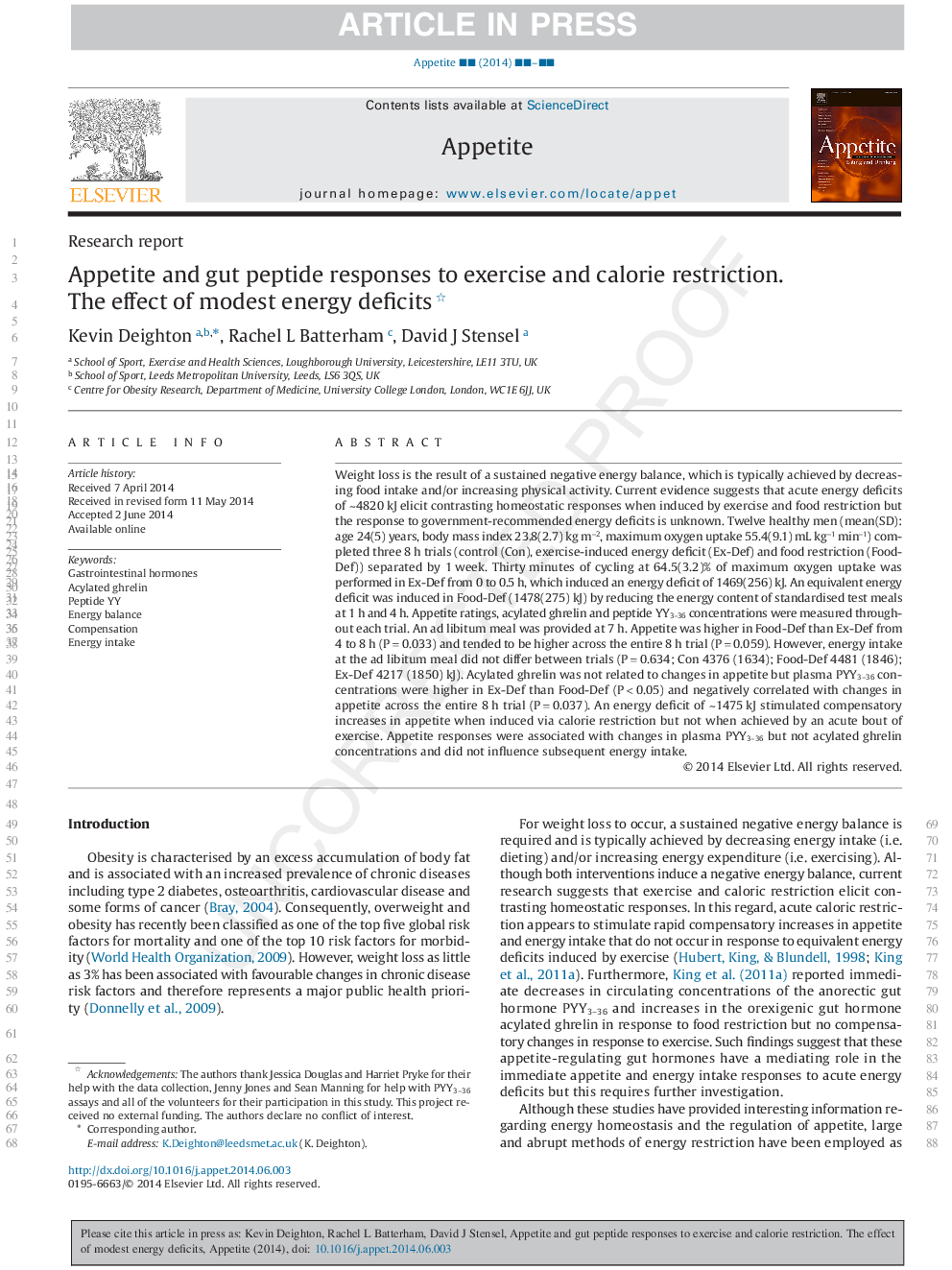| کد مقاله | کد نشریه | سال انتشار | مقاله انگلیسی | نسخه تمام متن |
|---|---|---|---|---|
| 7309887 | 1475399 | 2014 | 8 صفحه PDF | دانلود رایگان |
عنوان انگلیسی مقاله ISI
Appetite and gut peptide responses to exercise and calorie restriction. The effect of modest energy deficits
ترجمه فارسی عنوان
اشتها و پاسخ پپتید روده به ورزش و محدودیت کالری. اثر کمبود انرژی کم
دانلود مقاله + سفارش ترجمه
دانلود مقاله ISI انگلیسی
رایگان برای ایرانیان
کلمات کلیدی
موضوعات مرتبط
علوم زیستی و بیوفناوری
علوم کشاورزی و بیولوژیک
دانش تغذیه
چکیده انگلیسی
Weight loss is the result of a sustained negative energy balance, which is typically achieved by decreasing food intake and/or increasing physical activity. Current evidence suggests that acute energy deficits of ~4820âkJ elicit contrasting homeostatic responses when induced by exercise and food restriction but the response to government-recommended energy deficits is unknown. Twelve healthy men (mean(SD): age 24(5) years, body mass index 23.8(2.7)âkgâ
mâ2, maximum oxygen uptake 55.4(9.1)âmLâ
kgâ1â
minâ1) completed three 8âh trials (control (Con), exercise-induced energy deficit (Ex-Def) and food restriction (Food-Def)) separated by 1âweek. Thirtyâminutes of cycling at 64.5(3.2)% of maximum oxygen uptake was performed in Ex-Def from 0 to 0.5âh, which induced an energy deficit of 1469(256)âkJ. An equivalent energy deficit was induced in Food-Def (1478(275)âkJ) by reducing the energy content of standardised test meals at 1âh and 4âh. Appetite ratings, acylated ghrelin and peptide YY3-36 concentrations were measured throughout each trial. An ad libitum meal was provided at 7âh. Appetite was higher in Food-Def than Ex-Def from 4 to 8âh (Pâ=â0.033) and tended to be higher across the entire 8âh trial (Pâ=â0.059). However, energy intake at the ad libitum meal did not differ between trials (Pâ=â0.634; Con 4376 (1634); Food-Def 4481 (1846); Ex-Def 4217 (1850)âkJ). Acylated ghrelin was not related to changes in appetite but plasma PYY3-36 concentrations were higher in Ex-Def than Food-Def (Pâ<â0.05) and negatively correlated with changes in appetite across the entire 8âh trial (Pâ=â0.037). An energy deficit of ~1475âkJ stimulated compensatory increases in appetite when induced via calorie restriction but not when achieved by an acute bout of exercise. Appetite responses were associated with changes in plasma PYY3-36 but not acylated ghrelin concentrations and did not influence subsequent energy intake.
ناشر
Database: Elsevier - ScienceDirect (ساینس دایرکت)
Journal: Appetite - Volume 81, 1 October 2014, Pages 52-59
Journal: Appetite - Volume 81, 1 October 2014, Pages 52-59
نویسندگان
Kevin Deighton, Rachel L. Batterham, David J. Stensel,
